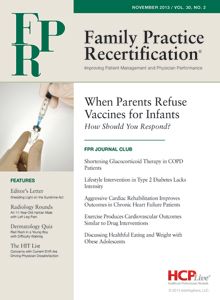Publication
Article
Family Practice Recertification
Tech-Savvy Physicians Adopting HIT Faster Than Social Media
Author(s):
Tech-savvy family physicians are largely embracing health information technology (HIT), though the same can't be said for social media.

Tech-savvy family physicians are largely embracing health information technology (HIT), though the same can’t be said for social media, according to a new trend report from ZocDoc, a Web-based service that optimizes physicians’ schedules.
For the first annual Digital Doctor Survey, 360 primary care providers (PCPs) and other healthcare professionals within ZocDoc’s network responded to questions concerning their use of health information technology (HIT), social media, and online reviews.
According to the survey results, 74% of physicians have already implemented HIT in their practices, which is a significantly higher percentage compared to the approximate 50% electronic health records (EHR) adoption reported by the US Department of Health and Human Services earlier this year. However, ZocDoc Founder and Chief Operating Officer Oliver Kharraz, MD, noted in a press release that physicians within his company’s network “tend to quickly adapt to the changing healthcare landscape in this digital world, which likely accounts for the disparity.”
In terms of physicians’ actual use of EHR systems, 63% of respondents indicated that they allow patients to fill out and submit medical forms online ahead of office visits, and roughly the same proportion of healthcare providers said they have sent prescriptions to a patient electronically.
In addition to HIT, 53% of physicians have a Facebook account for their practice, 28% are connected on LinkedIn, 34% have a Google+ profile, and 21% use Twitter. However, 30% of practitioners surveyed reported that they still don’t have a presence on any social media platforms, despite the fact that nearly one-third of their patients access those platforms for health-related matters, Kharraz said.
But physicians’ insufficient social media usage doesn’t mean they aren’t on the Web. In fact, 83% of respondents indicated that they have a website dedicated to their practice, and a similar majority of physicians are also actively managing their reputations — as well as monitoring the reputations of their colleagues and competitors — on anonymous doctor review websites such as RateMDs.com, according to the survey data.
“While reviews are a powerful factor in online patient behavior, doctors who fear that a few pieces of negative feedback could poison their reputations are mistaken, (as) patients are no less likely to book appointments with doctors who have received a few negative reviews than with their counterparts,” the ZocData data analysis team wrote in a white paper corresponding with the survey results. “Only when a provider’s overall rating falls to 2.5 stars or less do patients book precipitously fewer appointments with that provider.”
Despite those concerns about negative ratings, 85% of the physicians surveyed ranked their online reviews as fair or very fair.

2 Commerce Drive
Cranbury, NJ 08512
All rights reserved.





